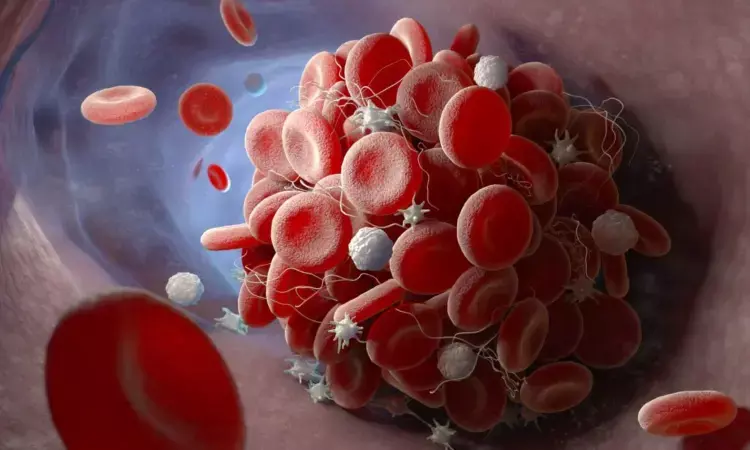- Home
- Medical news & Guidelines
- Anesthesiology
- Cardiology and CTVS
- Critical Care
- Dentistry
- Dermatology
- Diabetes and Endocrinology
- ENT
- Gastroenterology
- Medicine
- Nephrology
- Neurology
- Obstretics-Gynaecology
- Oncology
- Ophthalmology
- Orthopaedics
- Pediatrics-Neonatology
- Psychiatry
- Pulmonology
- Radiology
- Surgery
- Urology
- Laboratory Medicine
- Diet
- Nursing
- Paramedical
- Physiotherapy
- Health news
- Fact Check
- Bone Health Fact Check
- Brain Health Fact Check
- Cancer Related Fact Check
- Child Care Fact Check
- Dental and oral health fact check
- Diabetes and metabolic health fact check
- Diet and Nutrition Fact Check
- Eye and ENT Care Fact Check
- Fitness fact check
- Gut health fact check
- Heart health fact check
- Kidney health fact check
- Medical education fact check
- Men's health fact check
- Respiratory fact check
- Skin and hair care fact check
- Vaccine and Immunization fact check
- Women's health fact check
- AYUSH
- State News
- Andaman and Nicobar Islands
- Andhra Pradesh
- Arunachal Pradesh
- Assam
- Bihar
- Chandigarh
- Chattisgarh
- Dadra and Nagar Haveli
- Daman and Diu
- Delhi
- Goa
- Gujarat
- Haryana
- Himachal Pradesh
- Jammu & Kashmir
- Jharkhand
- Karnataka
- Kerala
- Ladakh
- Lakshadweep
- Madhya Pradesh
- Maharashtra
- Manipur
- Meghalaya
- Mizoram
- Nagaland
- Odisha
- Puducherry
- Punjab
- Rajasthan
- Sikkim
- Tamil Nadu
- Telangana
- Tripura
- Uttar Pradesh
- Uttrakhand
- West Bengal
- Medical Education
- Industry
Thromboprophylaxis with aspirin non-inferior to heparin after fracture: NEJM

USA: Thromboprophylaxis with aspirin is non-inferior to low-molecular-weight heparin in patients with extremity fractures that had been treated operatively or with any pelvic or acetabular fracture with regards to prevention of death, according to PREVENT CLOT trial.
In the study published in the New England Journal of Medicine, thromboprophylaxis with aspirin was associated with low incidences of pulmonary embolism, deep-vein thrombosis, and low 90-day mortality. Also, the authors did not find any evidence of additional safety risks associated with aspirin thromboprophylaxis in the trial population.
In patients with fractures, clinical guidelines recommend low-molecular-weight heparin for thromboprophylaxis, but there is a lack of trials of its effectiveness compared with aspirin. Considering this, the researchers conducted a pragmatic, multicenter, randomized, noninferiority trial enrolling patients 18 years and above who had a fracture of an extremity (anywhere from shoulder to the wrist or hip to midfoot) that had been treated operatively or who had any acetabular or pelvic fracture.
Twelve thousand two hundred eleven patients were randomly assigned to receive twice daily low-molecular-weight heparin (enoxaparin) at a 30mg dose (n=6110) or twice daily aspirin at 81 mg (n=6101) while in the hospital. Following hospital discharge, the patients continued to receive thromboprophylaxis as per the clinical protocols of each hospital. Death from any cause at 90 days (primary outcome) was determined. Secondary outcomes included deep-vein thrombosis, nonfatal pulmonary embolism, and bleeding complications.
The study revealed the following findings:
- Patients had a mean age of 44.6 years, 0.7% had a history of venous thromboembolism, and 2.5% had a history of cancer.
- Patients received a mean of 8.8±10.6 in-hospital thromboprophylaxis doses and were prescribed a median 21-day supply of thromboprophylaxis at discharge.
- Death occurred in 0.78% of patients in the aspirin group and 0.73% in the low-molecular-weight–heparin group (difference, 0.05 percentage points).
- Deep-vein thrombosis occurred in 2.51% of patients in the aspirin group and 1.71% in the low-molecular-weight–heparin group (difference, 0.80 percentage points).
- The incidence of pulmonary embolism (1.49% in each group), bleeding complications, and other serious adverse events were similar in the two groups.
"We found that thromboprophylaxis with aspirin is non-inferior to low-molecular-weight heparin for preventing fatal events in orthopedic trauma patients and was associated with low frequencies of pulmonary embolism, deep vein thrombosis, and death from any cause at 90 days," the researchers wrote.
They stated, "these findings are consistent for outcomes of death linked to nonfatal pulmonary embolism and pulmonary embolism. In addition, we found no evidence of additional safety risks linked with aspirin thromboprophylaxis in our trial population."
Reference:
The study "Aspirin or Low-Molecular-Weight Heparin for Thromboprophylaxis after a Fracture," was published in the New England Journal of Medicine.
DOI: https://www.nejm.org/media/doi/full/10.1056/NEJMoa2205973
Dr Kamal Kant Kohli-MBBS, DTCD- a chest specialist with more than 30 years of practice and a flair for writing clinical articles, Dr Kamal Kant Kohli joined Medical Dialogues as a Chief Editor of Medical News. Besides writing articles, as an editor, he proofreads and verifies all the medical content published on Medical Dialogues including those coming from journals, studies,medical conferences,guidelines etc. Email: drkohli@medicaldialogues.in. Contact no. 011-43720751


